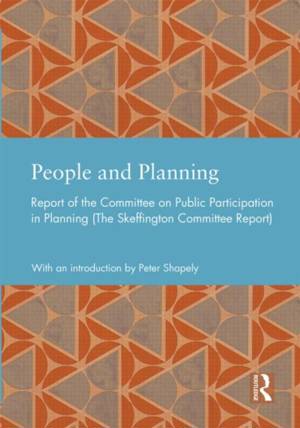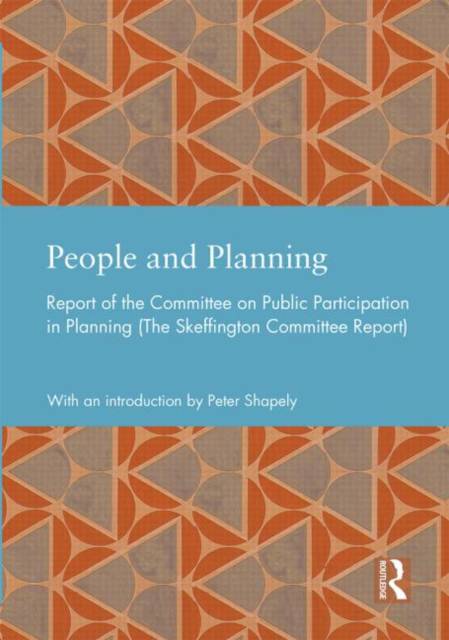
- Retrait gratuit dans votre magasin Club
- 7.000.000 titres dans notre catalogue
- Payer en toute sécurité
- Toujours un magasin près de chez vous
- Retrait gratuit dans votre magasin Club
- 7.000.0000 titres dans notre catalogue
- Payer en toute sécurité
- Toujours un magasin près de chez vous
People and Planning
Report of the Committee on Public Participation in Planning (the Skeffington Committee Report)
The Skeffington CommitteeDescription
The Skeffington Committee was appointed in 1968 to look at ways of involving the wider public in the formative stages of local development plans. It was the first concerted effort to encourage a systematic approach to resident participation in planning and the decision-making process, in contrast to the entirely top down process created by the 1947 Town and Country Planning Act.
The origins of the Skeffington Report lay in the 1965 publication by the Planning Advisory Group of The Future of Development Plans, which recommended changes to the planning system to include much greater public participation. It called for all plans to be publicly debated in full, with the opportunity for representations to be made throughout the entire preparation process. There was also a growing realisation of the impact of the American planning experience and a growth of interest in the concept of participatory democracy as opposed to representative democracy.
However, the immediate impact of the Skeffington Committee was limited. It was criticised as being too ambiguous and as encouraging nothing more than greater publicity and as 'educating' residents from the planners perspective. 'Participation' was inadequately defined and the Report was seen to simply promote a more efficient system by convincing people of the virtues of planning. Local authorities used and undermined the idea of participation to simply speed up the planning process by giving their decisions a seal of legitimacy. Technocrats and local authorities simply subverted the ambiguities of the Report for their own purposes.
Yet this is to underestimate the long term impact of the underlying principles first expressed in the Skeffington Report. It has been a long and tortuous process and in many respects it remains a difficult ideal to implement in an entirely satisfactory and systematic way. Nevertheless, the concept of participation established by the Report has continued to be a central consideration in planning.
Spécifications
Parties prenantes
- Auteur(s) :
- Editeur:
Contenu
- Nombre de pages :
- 70
- Langue:
- Anglais
- Collection :
Caractéristiques
- EAN:
- 9780415827874
- Date de parution :
- 29-08-13
- Format:
- Livre relié
- Format numérique:
- Genaaid
- Dimensions :
- 173 mm x 246 mm
- Poids :
- 358 g

Les avis
Nous publions uniquement les avis qui respectent les conditions requises. Consultez nos conditions pour les avis.






